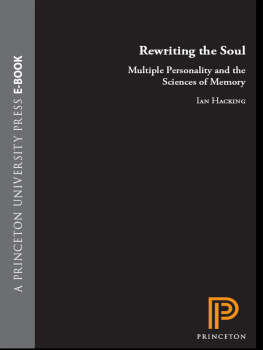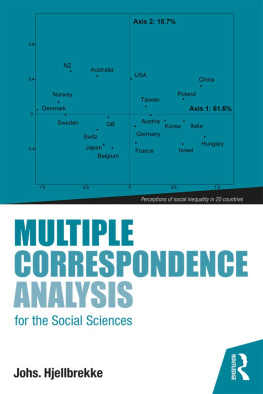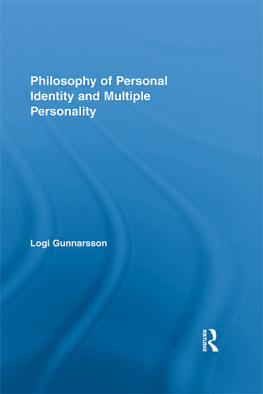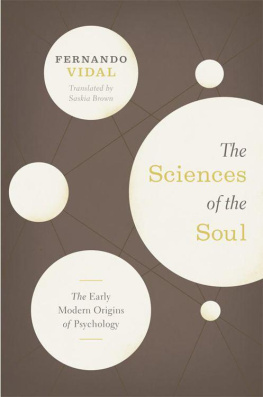Hacking - Rewriting the soul multiple personality and the sciences of memory
Here you can read online Hacking - Rewriting the soul multiple personality and the sciences of memory full text of the book (entire story) in english for free. Download pdf and epub, get meaning, cover and reviews about this ebook. City: Princeton;N.J, year: 1998;2013, publisher: Princeton University Press, genre: Romance novel. Description of the work, (preface) as well as reviews are available. Best literature library LitArk.com created for fans of good reading and offers a wide selection of genres:
Romance novel
Science fiction
Adventure
Detective
Science
History
Home and family
Prose
Art
Politics
Computer
Non-fiction
Religion
Business
Children
Humor
Choose a favorite category and find really read worthwhile books. Enjoy immersion in the world of imagination, feel the emotions of the characters or learn something new for yourself, make an fascinating discovery.
- Book:Rewriting the soul multiple personality and the sciences of memory
- Author:
- Publisher:Princeton University Press
- Genre:
- Year:1998;2013
- City:Princeton;N.J
- Rating:3 / 5
- Favourites:Add to favourites
- Your mark:
- 60
- 1
- 2
- 3
- 4
- 5
Rewriting the soul multiple personality and the sciences of memory: summary, description and annotation
We offer to read an annotation, description, summary or preface (depends on what the author of the book "Rewriting the soul multiple personality and the sciences of memory" wrote himself). If you haven't found the necessary information about the book — write in the comments, we will try to find it.
Hacking: author's other books
Who wrote Rewriting the soul multiple personality and the sciences of memory? Find out the surname, the name of the author of the book and a list of all author's works by series.
Rewriting the soul multiple personality and the sciences of memory — read online for free the complete book (whole text) full work
Below is the text of the book, divided by pages. System saving the place of the last page read, allows you to conveniently read the book "Rewriting the soul multiple personality and the sciences of memory" online for free, without having to search again every time where you left off. Put a bookmark, and you can go to the page where you finished reading at any time.
Font size:
Interval:
Bookmark:

Rewriting the Soul
Rewriting the Soul
MULTIPLE PERSONALITY AND THE SCIENCES OF MEMORY
Ian Hacking
PRINCETON UNIVERSITY PRESS
PRINCETON, NEW JERSEY
Copyright 1995 by Princeton University Press
Published by Princeton University Press, 41 William Street,
Princeton, New Jersey 08540
In the United Kingdom: Princeton University Press,
Chichester, West Sussex
All Rights Reserved
Library of Congress Cataloging-in-Publication Data
Hacking, Ian.
Rewriting the soul : multiple personality and the sciences of memory / Ian Hacking.
p. cm.
Includes bibliographical references (p. ) and index.
ISBN 0-691-03642-X
ISBN 0-691-05908-X (pbk)
1. Multiple personalityPhilosophy. 2. MemorySocial aspects. 3. Multiple personalitySocial aspects. 4. Multiple personalityHistory. 5. SoulPsychological aspects. I. Title.
RC569.5.M8H33 1995
153.12dc20 94-41975
This book has been composed in Galliard
Princeton University Press books are printed on acid-free paper and meet the guidelines for permanence and durability of the Committee on Production Guidelines for Book Longevity of the Council on Library Resources
Second printing, and first paperback printing, with corrections, 1998
http://pup.princeton.edu
Printed in the United States of America
2 3 4 5 6 7 8 9 10
FOR OLIVER
Contents
CHAPTER 1 |
CHAPTER 2 |
CHAPTER 3 |
CHAPTER 4 |
CHAPTER 5 |
CHAPTER 6 |
CHAPTER 7 |
CHAPTER 8 |
CHAPTER 9 |
CHAPTER 10 |
CHAPTER 11 |
CHAPTER 12 |
CHAPTER 13 |
CHAPTER 14 |
CHAPTER 15 |
CHAPTER 16 |
CHAPTER 17 |
CHAPTER 18 |
Acknowledgments
MANY PEOPLE have helped me, but here I would like to speak for all the members of a seminar on multiple personality that met on Monday evenings during the winters of 1992 and 1993. We thank our guests who came on those cold dark nights for no reward, except love of their subject, to share their experience, knowledge, and opinions: Paul Antze, medical anthropologist, York University; John Beresford, psychiatrist; Adam Crabtree, clinical psychologist; Toby Gelfand, Hannah Professor of History of Medicine, University of Ottawa; Peter Keefe, psychiatrist at the Clarke Institute of Psychiatry and Mount Sinai Hospital, Toronto; Michael Kenny, anthropologist, Simon Fraser University; Danny Kaplan and Stanley Klein, Community Head Injury Rehabilitation Services; Michael Lambek, anthropologist, University of Toronto; Ruth Leys, Humanities Center, The Johns Hopkins University; Harold Merskey, psychiatrist, London Psychiatric Hospital, and professor of psychiatry at the University of Western Ontario; Margo Rivera, clinical psychologist and director of Education/Dissociation. Special thanks to Paul Antze who worked with us throughout the winter of 1992, and to Stanley Klein, who did the same in 1993.
At another level I have to thank the Social Sciences and Humanities Research Council of Canada for a small grant to cover research expenses, which enabled me to enlist the splendid help of Andr Leblanc.
I owe a special debt of gratitude to my editor, Ann Himmelberger Wald.
Rewriting the Soul
Introduction
MEMORY is a powerful tool in quests for understanding, justice, and knowledge. It raises consciousness. It heals some wounds, restores dignity, and prompts uprisings. What better motto for automobile license plates in Qubec than Je me souviens?I remember. Memories of the holocaust and of slavery must be passed on to new generations. Severe and repeated child abuse is said to be a cause of multiple personality disorder; the illness is to be treated through a recovery of lost memories of pain. An aging population is scared of Alzheimers disease, which it regards as a disease of memory. In a most extraordinary venture into the mind by way of biochemistry, the central focus of research in brain science is memory. An astonishing variety of concerns are pulled in under that one heading: memory.
My curiosity is piqued exactly when something seems inevitable. Why are such diverse interests grouped under memory? One senior American philosopher, Nelson Goodman, as committed to the arts as to the sciences, has called himself skeptical, analytical, and constructionalist. I have those tendencies too. I wonder skeptically: why has it been essential to organize so many of our present projects in terms of memory? I wonder analytically: what are the dominating principles that lock us into memory as an approach to so many of the problems of life, from child rearing to patriotism, from aging to anxiety? And I wonder, what constructions underlie these principles? I am not looking for the trite wisdom that there are different kinds of memory. I wonder why there is one creature, memory, of which there are so many different kinds.
I do not want, now, a grand reflection on memory, or its associated horrors such as genocide and child abuse. Skeptics are unenthusiastic about systems, about theories of everything. I propose to examine an entirely specific case of memory-thinking. Multiple personality is perfect for the purpose. This illness, which seemed as nothing twenty-five years ago, is flourishing all over North America. Amnesia has been built in to the official diagnostic criteria for what has just been renamed dissociative identity disorder. Dissociation into personality fragments is caused (on current theorizing) by abuse in childhood that had long been forgotten. Multiple personality is a paradigmatic, if tiny, memory-concept.
We can get some perspective on the question of how memory came into play, because multiple personality, though florid now, is not new. One of its previous incarnations, beginning in 1876, took place when a whole new discourse of memory came into being. People have always been fascinated by memory. In classical Greece, and in the High Middle Ages, mastery of the art of memory was one of the most admired of skills. But the sciences of memory arose only in the second half of the nineteenth century. One of these sciences, especially developed in France, fixed on pathological memory, and multiple personality is a part of that new science. I argue that the way in which the sciences of memory evolved has much to do with the frontline memory confrontations of today.
As a research strategy I have always been much taken by what Michel Foucault named archaeology. I think that there are sometimes fairly sharp mutations in systems of thought and that these redistributions of ideas establish what later seems inevitable, unquestionable, necessary. I hold that whatever made possible the most up-to-the-moment events in the little saga of multiple personality is strongly connected to fundamental and long-term aspects of the great field of knowledge about memory that emerged in the last half of the nineteenth century. I can use multiple personality, then and now, as a microcosm of thinking-and-talking-about-memory, then and now. Hence in the middle of the book I open a narrow window looking out onto memoryand multiple personalitylong ago. The venue is France 18741886. I choose it because that was the center of the span of time when the structure of the modern sciences of memory came into being.
Next pageFont size:
Interval:
Bookmark:
Similar books «Rewriting the soul multiple personality and the sciences of memory»
Look at similar books to Rewriting the soul multiple personality and the sciences of memory. We have selected literature similar in name and meaning in the hope of providing readers with more options to find new, interesting, not yet read works.
Discussion, reviews of the book Rewriting the soul multiple personality and the sciences of memory and just readers' own opinions. Leave your comments, write what you think about the work, its meaning or the main characters. Specify what exactly you liked and what you didn't like, and why you think so.












